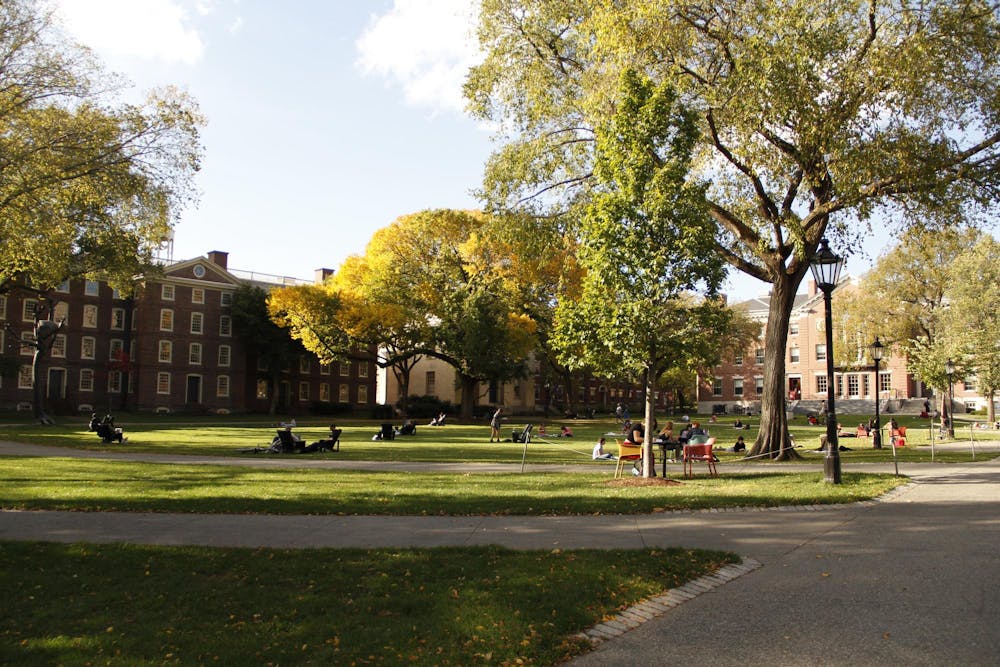On Wednesday, six students affiliated with the Brown Divest Coalition made the case for divesting from 10 companies with ties to Israel to a University advisory committee.
The students presented a divestment proposal to the Advisory Committee on University Resources Management, an advisory body that issues non-binding recommendations on how Brown should allocate its resources. The proposal was written by members of BDC and identifies 10 companies which they claim “facilitate the Israeli occupation of Palestinian territory.”
Following the presentation, committee chair James Kellner pressed the representatives to follow up with ACURM after the meeting to “tighten up” their argument that divestment would directly cause a reduction in social harm.
ACURM must issue their recommendation to President Paxson P’19 P’MD’20 by Sept. 30.
Brown Divest Coalition representatives gave a presentation tailored to ACURM’s charge of determining whether Brown’s allocation of resources is contributing to social harm.
The meeting was the first in a series of public forums in which community members will have the opportunity to meet with ACURM to discuss the divestment proposal. On Sept. 9, a group of students who oppose the divestment proposal will publicly meet with the committee. Two open listening sessions will be held on Sept. 10 and Sept. 11.
For ACURM to recommend divestment, a majority of the 11 voting members must determine that divestment would positively impact a social harm issue or a Brown investment contributes to a “social harm so grave that it would be inconsistent with the goals and principles of the university,” per the committee’s charge.
Throughout the presentation, the BDC members made arguments for both conditions of this two-pronged test, drawing from and expanding on arguments made in a precursor 2020 report which Paxson previously declined to advance.
BDC representatives argued that occupation and settlements in the West Bank and East Jerusalem, in addition to the separation wall through the West Bank, constituted grave social harm. In 2020, ACURM’s predecessor shared this view.
They then moved to discuss Israel’s attacks in Gaza which have killed over 40,000 Palestinians since the Oct. 7 Hamas attacks that killed 1,200 in Israel.
Aboud Ashhab ’25, a BDC representative, claimed the current actions of the Israel governments were at odds with stated University values and ACURM’s charge.
“Is possibly being invested in an ongoing genocide and in an entrenched occupation and displacement of the Palestinian people promoting human dignity?” he said. “Is it promoting the values of inclusion, equity and justice?”
BDC representatives also laid out their belief that the continued investment in the companies they identified violate the University’s stated goals. They drew upon Brown’s Slavery and Justice Report, which reads “the University has a special obligation to ensure that it does not profit from such practices,” referencing the “gross injustice” of slavery.
They also noted a 2019 undergraduate referendum where a majority of respondents supported divestment. They also presented results from The Herald’s spring 2024 poll, in which over two-thirds of respondents supported divestment.
BDC also explained to ACURM how they decided on the 10 companies listed in the report.
In 2020, ACURM’s predecessor recommended some criteria that should determine if Brown should divest from a company, including if the company’s products and services contribute to violence, illegal settlements or the Separation Wall. BDC used three international databases to determine if a company met at least two of these five criteria.
“The research conducted by these internationally recognized screening databases informed the selection of 10 companies as particularly egregious offenders,” said Anila Lopez Marks ’26, a BDC representative.
Representatives also harkened on past successful divestment initiatives, pointing to the University’s divestment from South Africa and Sudan. They noted how, following University divestment, Congress passed laws imposing sanctions on South Africa and divestment from Sudan.
After the presentation, BDC representatives answered questions from ACURM — most from Kellner, its chair — which were mainly focused on the feasibility and impact of divestment.
Kellner noted that there exist many barriers to divestment, including a letter signed by 24 state attorneys general that warned of potential legal consequences. Kellner said divestment could lead to challenges in collaborating with universities in other states, potentially limiting Brown scholars in their studies.
Rafi Ash ’26, a BDC representative, pushed back on the letter, calling it “unfounded” and “a fundamental threat (to) Brown University’s mission and goals of academic freedom.” He argued that Brown is not the institution limiting academic freedom if it chooses to divest. Instead, he placed the blame on any potential restrictions in inter-university collaboration on the attorneys general themselves.
Kellner also asked how BDC believes the University should view companies that may provide both social harm and social benefit, saying that divestment from such companies may detract from the potential social benefits they provide.
The Corporation is set to vote on divestment in their meeting in October.

Ryan Doherty is the managing editor of digital content and vice president of The Herald's 135th editorial board. He is a junior from Carmel, NY who is concentrating in chemistry and economics. He previously served as a university news and science & research editor, covering faculty and higher education.





